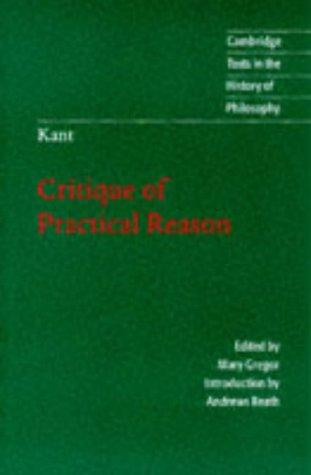UdeRecife reviewed Critique of practical reason by Immanuel Kant (Cambridge texts in the history of philosophy)
Review of 'Critique of practical reason' on 'Goodreads'
3 stars
Having finally worked my way through another of Kant’s Critiques, what has been my experience on this one? Well, apart from whatever else everyone has already said about it (for Kant’s works are one of the most dissected ones in the history of Philosophy), I find here more useful to explore his complete lack of clarity in regards to the way he expresses his ideas.
For this is indeed a tough read. Ok, not so tough as the ridiculously difficult Critique of Pure Reason, upon which this book builds upon. But mind that it is only a bit easier to read — if, for nothing else, because it’s a shorter work. After all, even when you’re bombarded by the recurring thoughts of asking yourself why you have started this book in the first place, at least you don’t get as desperate or as depressed as you were while reading …
Having finally worked my way through another of Kant’s Critiques, what has been my experience on this one? Well, apart from whatever else everyone has already said about it (for Kant’s works are one of the most dissected ones in the history of Philosophy), I find here more useful to explore his complete lack of clarity in regards to the way he expresses his ideas.
For this is indeed a tough read. Ok, not so tough as the ridiculously difficult Critique of Pure Reason, upon which this book builds upon. But mind that it is only a bit easier to read — if, for nothing else, because it’s a shorter work. After all, even when you’re bombarded by the recurring thoughts of asking yourself why you have started this book in the first place, at least you don’t get as desperate or as depressed as you were while reading the unbearably long first Critique (800 pages or so of the most torturing philosophical prose).
So here I again join the choir of all those that before me thought of Kant as an obscure writer. And be aware that even calling him this is an understatement. But don’t take my word on this. Let me quote you some passage at random from this book: “If enthusiasm in the most general sense is an overstepping of the bounds of human reason undertaken on principles, then moral enthusiasm is such an overstepping of the bounds that practical pure reason sets to humanity,thereby forbidding us to place the subjective determining ground of dutiful actions – that is, their moral motive – anywhere else than in the law itself or to place the disposition which is thereby brought into the maxims anywhere else than in respect for this law, and so commanding us to make the thought of duty, which strikes down all arrogance as well as vain self-love, the supreme life-principle of all morality in human beings.” (1788) How then, you ask, did he got away with it?
Well, because he deservedly managed to get famous among the philosophical circles of his time for his then new ideas on epistemology (first Critique, 1781/87), moral philosophy (this one, 1788), and aesthetics (the third Critique, 1790). And this originality of his was as good an excuse as any to put up with his complete lack of ability in making himself clear by writing. Once established as a great philosopher, the burden of making the message understandable was shifted to his readers. That being so, what can we do about it now?
Well, nothing, really. If you’re aware of Kant’s historical importance, and you need (or want) to know more about it reading directly from him, try first to know about his ideas from someone else who can map them out in a simpler, more accessible way. Then, while reading him, try at all costs to avoid the trap of feeling you’re a worthless reader. You aren’t. Kant was indeed a lousy writer. And if you think that reading Kant from others is akin to cheat, don’t worry — it's not. Kant himself was very open to the idea of having others translate his thinking to a more clear and understandable language.
Once you overcome your fears, and you manage to find the right frame of mind to cope with Kant’s complete lack of clarity, reading him almost becomes as joyful as striving to complete a very challenging task. Imagine yourself climbing Mount Everest; or running a marathon. You may not be the strongest or the fastest, but completing such a task will inevitably make you a part of a very strict group of people who have achieved something seemingly impossible to do. Kant's works are like this.
Well, at least this was my experience now that I have finished this famous second Critique. If on top of this I add what to me felt like an added bonus, that of reading directly, within its context, one of Kant’s greatest quotes, the inspired, and inspiring, “Two things fill the mind with ever new and increasing admiration and reverence the more often and more steadily one reflects on them: the starry heavens above me and the moral law within me” (1788), I can confidently confess that in some weird and twisted way I truly enjoyed this book. Maybe with the proper set of mind you can enjoy it too.

